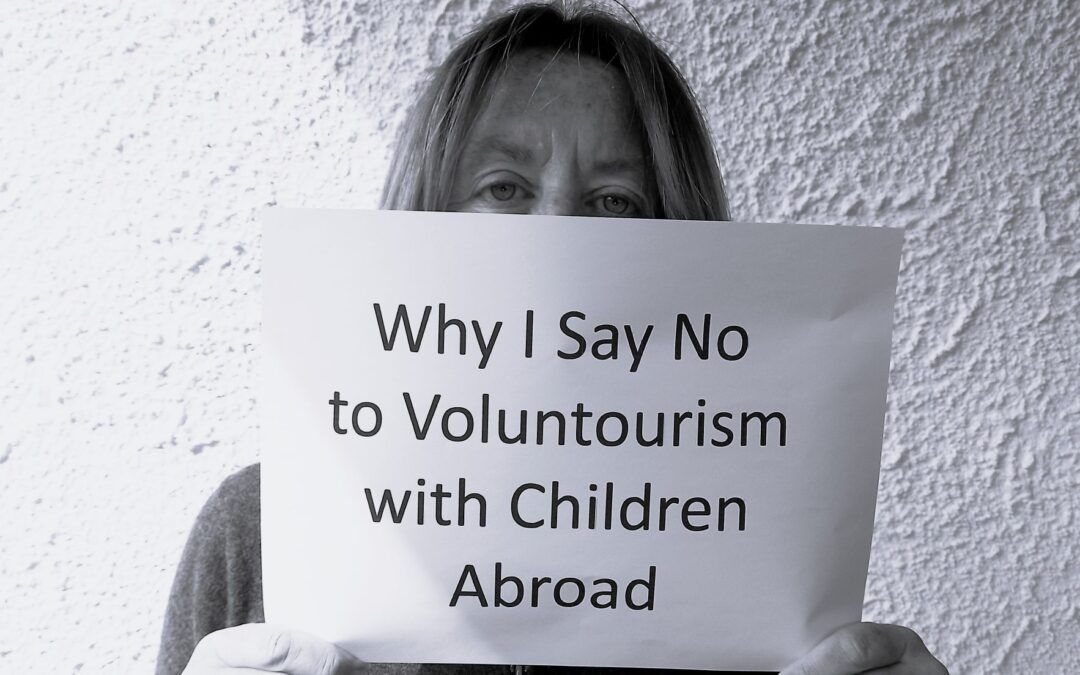
1. The Paradox of Good Intentions
In an era where safeguarding vulnerable minorities is paramount, a troubling paradox persists: the widespread acceptance of voluntourism involving children overseas.
This practice typically involves short-term trips abroad where individuals, often with no specific qualifications or vetting, volunteer in orphanages, schools, or other institutions that care for children. Activities can range from teaching and playing to helping with daily routines.
Why does this seemingly well-intentioned practice often prove problematic, regardless of the good intentions of those involved? And why does a double standard seem to apply, where actions deemed unacceptable in our own communities are often normalized abroad?
Let’s examine this critical disparity:
- At home, we rightly require background checks, professional training, and ongoing supervision for anyone working with children.
- Abroad? Often, it takes mere minutes to book a voluntourism activity with children online — with no questions asked about qualifications or experience. You pay, you show up, and you interact with vulnerable children.
This stark contrast highlights a dangerous double standard that prioritizes the volunteer’s desire to help over the child’s well-being and safety.
2. My Experience in Cambodia: Witnessing the Double Standards in Action
During my years in Cambodia’s development sector, I witnessed this troubling paradox first-hand: well-meaning volunteers helping children in ways they will not be allowed in their home countries.
- I remember rural primary schools where a revolving door of foreign volunteers with no educational background, no vetting of their credentials, no experience with educating minors, and no understanding of the local culture would teach for a few weeks. Then, just as the children began to build a connection, these volunteers would leave, only to be replaced by another equally unqualified foreigner.
- I also recall the tour buses filled with unvetted and unknown foreigners who would briefly descend upon a nursery school for a few hours, playing with children and taking photos before moving on to their next tourist stop.
While every single volunteer I met was undoubtedly driven by a genuine desire to help, their actions, however well-intentioned, inadvertently perpetuated a significant double standard. Behaviors that we would immediately deem unacceptable and potentially harmful within our own communities were normalized, even celebrated, in a foreign context.
I empathize deeply with individuals who, during their holidays, choose to dedicate some of their time to connect with a country like Cambodia beyond the typical tourist trails and offer what they believe is help. Their motivation often stems from a sincere desire to make a positive contribution.
And yet, it is precisely these well-intentioned actions that often perpetuate a harmful double standard. We would never, under any circumstances, allow strangers to interact with our own children at home in the casual and often unsupervised ways that we deem acceptable in a developing country.
3. The Seeds of Doubt: Applying the Double Standard Back Home
To truly grasp the extent of this double standard, let’s take those real-life examples I experienced in Cambodia and apply them to our community back home.
- Imagine an untrained, unvetted volunteer teaching your child’s class for two weeks, forming temporary bonds, and then abruptly departing, only to be replaced by another equally unqualified individual. Would you tolerate this situation?
- Consider a tour group with individuals who have undergone no prior screening, entering your child’s kindergarten, interacting freely with the children, taking numerous photographs, and then simply leaving. Would you not demand accountability from the institution that allowed this?
- What if a tourist walked into a local park and began distributing gifts to children, playing with them unsupervised, and then posting their photos online without any regard for privacy or child protection? Would you not be alarmed by such behavior?
These scenarios are unthinkable in our neighborhoods,and for very valid reasons rooted in child safety and well-being. Yet, when these very same interactions occur in developing nations, they are often accepted and even praised as acts of generosity and kindness.
4 . Challenging the “Good Intentions” Narrative: Unpacking the Motivations
Why do we, often unconsciously, accept lower standards of interaction and care for vulnerable children abroad than we would ever tolerate for children in our own communities? Based on my experience, several interconnected factors contribute to the persistence of these harmful double standards:
- The Savior Complex: This deeply ingrained belief leads many to believe they are “rescuing” children in developing countries, often reinforcing harmful stereotypes of helplessness and dependency, and perpetuating a subtle colonial mindset.
- The Feel-Good Factor: Society often excuses potentially harmful actions if the intent was perceived as “to help,” prioritizing the volunteer’s emotional experience of feeling helpful over the actual long-term well-being and needs of the child.
- The “Better Than Nothing” Fallacy: This flawed belief suggests that any form of help, regardless of its quality or sustainability, is inherently better than no help at all. This ignores the potential for low-quality interventions to cause more harm than good. We might briefly acknowledge this sentiment, recognizing the desire to contribute, but must emphasize that good intentions alone do not guarantee positive outcomes and can lead to negative consequences.
- Lack of Awareness: Many well-meaning volunteers are simply unaware of the potential harm they can cause, the complexities of child protection in different cultural contexts, and the existence of ethical and sustainable alternatives. The allure of directly “helping” children can often blind them to the potential negative impacts of their actions.
Regardless of the various motivations that lead individuals and societies to accept a double standard with little to no stigma attached, we must begin to challenge these underlying assumptions and think critically about the real consequences of our “good intentions.”
5. Broader Implications: The Unequal Playing Field
It is crucial to explicitly address the inherent power dynamics at play in voluntourism involving children. Often, volunteers come from wealthier nations and interact with children in developing countries who are in vulnerable circumstances.
This dynamic can unintentionally reinforce existing inequalities, creating a sense of dependency and potentially undermining local communities and long-term solutions.
The ethical implications of this imbalance must be carefully considered, as our desire to help should never inadvertently perpetuate systems of inequality.
6. Volunteering For Children, Not With Them: The Professionals doing good Solution
The recognition of these harmful double standards and the potential for unintended negative consequences led to the founding of Professionals Doing Good (Pdg).
We believe that the desire to contribute internationally should be channeled through ethical, long-term, and skilled-based volunteering that truly empowers local organizations and communities.
Our approach is centered on volunteering for children, focusing on strengthening the systems and professionals who provide their care, rather than direct, often unskilled interaction.
- Since 2017, PDG has maintained an unwavering commitment to not facilitating international volunteering that involves direct interaction with children. This stance is a direct response to the very real harms and ethical dilemmas posed by traditional voluntourism with children.
- In 2025, Pdg took a further step and we formalized our commitment by publishing a “No International Volunteer with Children Policy.“ This policy reflects our unwavering dedication to child safety and ethical practices.
7. Join the Ethical Movement: Children’s Rights are Universal
We are in good company. Pdg’s commitment to avoiding direct volunteering with children aligns with international frameworks such as The UN Convention on the Rights of the Child and The ChildSafe Movement‘s mission to end child exploitation. However, more voices are needed to amplify this message.
You don’t need to have volunteered with children to recognize that children’s rights are universal. Here’s how you can take action:
- Educate Yourself: Learn more about the ethical issues surrounding “voluntourism with children in developing countries.
- Support Ethical Organizations: Volunteer your skills with organizations that prioritize sustainable, community-led initiatives, and understand the potential negative impact of short-term volunteers on children.
- Challenge Misconceptions: Speak up against the “savior complex” and the “better than nothing” fallacy when you encounter them.
- Rethink Your Travel: Choose ethical travel experiences that support local communities without exploiting vulnerable children. Consider visiting organizations accompanied by staff who can explain their work without direct interaction with the children. No need to spend time with them to help them!
- Share This Article: Spread awareness by sharing this article and other resources that promote ethical alternatives to volunteering with children overseas.
- Support Professionals doing good (Pdg): Learn more about our ethical skilled-based volunteering model and contribute to our mission.
Let’s work together to create a future where children’s rights are universally respected and where volunteering truly makes a positive and lasting impact.
8. Take Action! Consider becoming a skilled volunteer with Pdg
If you still want to volunteer in Cambodia, become a skilled-based volunteer by sharing your professional skills with the local staff of selected ethical grassroots organizations. We at Pdg can help you find opportunities!
Remember, this approach is not just applicable to Cambodia but can be a rule of thumb for responsible volunteering anywhere in the world.
Start your volunteer journey today!

